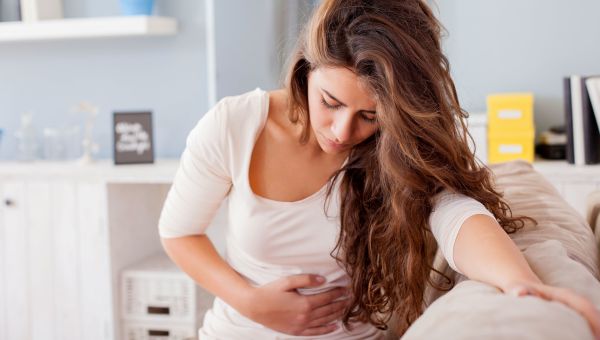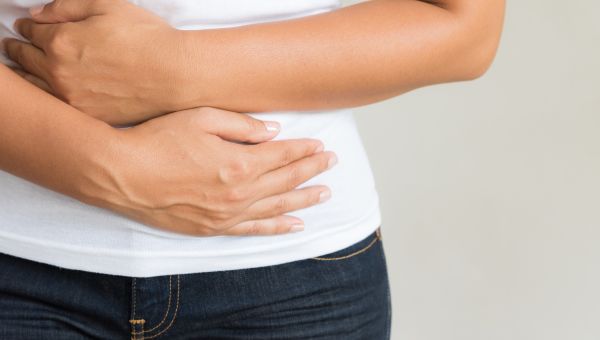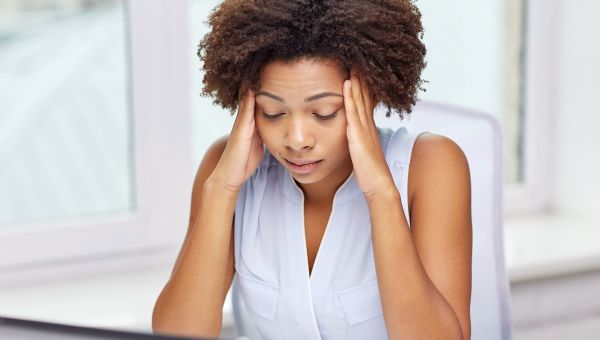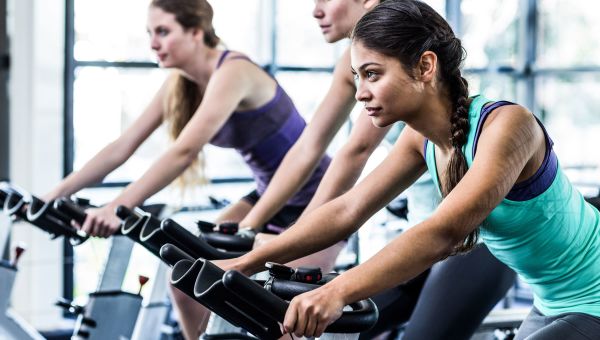5 tips for easing premenstrual symptoms
The majority of people who have periods may experience premenstrual symptoms from time to time, here are five tips that may help you feel better.
Updated on August 11, 2023

Do you tend to feel exhausted, bloated or have cravings the week leading up to your period? If so, you could be experiencing premenstrual syndrome (PMS). According to the American College of Obstetricians and Gynecologists, PMS refers to physical and mood changes that can have an impact on daily life and occur during the days before menstruation each month.
While PMS can vary from person to person, it’s estimated that 80 to 90 percent of people who menstruate experience at least one premenstrual symptom, which may come and go over time. About three to eight percent of people who have a period may experience a severe form of PMS called premenstrual dysphoric disorder (PMDD), which can significantly interfere with relationships and functioning at work, school, or home.
Healthcare providers (HCPs) diagnose PMS by looking for a pattern of symptoms that occur for at least three menstrual cycles in a row, begin five days before your period starts, stop at least four days after menstruation begins, and may affect daily activities. While everyone’s experience is different, the symptoms of PMS tend to occur in a predictable pattern, although they may change in intensity from month to month.
To identify your pattern, it can help to keep a daily diary of your symptoms and note when your period starts and ends for at least two to three months.
Although the exact causes of PMS remain unknown, monthly cyclical changes in the levels of progesterone and estrogen, as well as fluctuations in serotonin (a brain chemical that plays in important role in mood) are thought to contribute. Lifestyle factors such as lack of exercise and eating a diet high in caffeine, sugary foods, and junk foods have also been linked to PMS. Typical symptoms include cravings (often for sweet or salty foods), mood changes, difficulty concentrating, headaches, fatigue, trouble sleeping, and bloating.
Diana Kumar, MD, an OBGYN in Denver, Colorado, says you should see your HCP if your premenstrual symptoms are affecting your lifestyle. In addition to consulting with your HCP, you can take active steps in your daily life to lessen your symptoms. Here are five typical premenstrual symptoms, and what you can do to feel better.

Food cravings
Many people experience food cravings before and during their periods. A study published in The FASEB Journal in 2016 found that changes in levels of the hormones progesterone and estrogen may be associated with cravings for high-carb and sugary foods. One way to control cravings is to identify your food patterns by writing down what you eat in a journal.
“I tell my patients to keep a food diary. Sometimes when you write it down, it makes you realize what you're eating,” says Dr. Kuma.
Tweaks to your diet may also make a difference. Eating foods high in sugar and simple carbohydrates, like a doughnut or cookies, can cause your blood sugar to spike, and leave you craving more sweets. Try eating foods like fruits and green leafy vegetables, and complex carbs which have a low glycemic index, like sweet potatoes, whole wheat pasta, or brown rice. Complex carbs are absorbed more slowly into your body, which can help even out blood sugar levels, ease mood changes and curb cravings.
Another option: hormonal birth control like the pill, patch, ring, implant, or hormonal IUD. These reversible birth control options may decrease cravings by evening out hormone fluctuations, which could help manage other premenstrual symptoms, too.

Mood changes
Fluctuating hormones that accompany the menstrual cycle have been linked to premenstrual mood changes such as sadness, anxiety, tension, irritability, anger, and feeling overwhelmed. These changes typically go away after menstruation begins.
Lifestyle changes that improve sleep and decrease stress may help ease premenstrual mood changes. Consider adding regular exercise and/or relaxation techniques to your daily routine, like breathing exercises, meditation, yoga, or massage therapy. Try setting a regular sleep routine and improving sleep habits to relieve stress and enhance mood. In addition, hormonal birth control may ease mood changes. Your HCP can provide information about what type of birth control may be right for you.
People with underlying mental health conditions like depression or anxiety can experience an exacerbation of their symptoms before their period starts. After menstruation begins, their symptoms may improve but not completely resolve.
Speaking with your HCP can help you understand if you may have an underlying condition, and whether medical treatment and/or mental health counseling may be right for you. One treatment that may help is cognitive behavioral therapy (CBT), talk therapy that re-trains your mind to identify unsettling or negative thoughts and teaches you coping techniques. Treating a person’s underlying depression and anxiety may decrease worsening symptoms that happen with their period, according to Kumar.

Bloating, swelling, or weight gain
Premenstrual hormone fluctuations can also cause physical symptoms like bloating, weight gain and swelling in your hands and feet.
Healthy diet choices may help with these symptoms. Try limiting alcohol and cutting back on foods high in caffeine and salt, which may contribute to fluid retention and bloating premenstrually. Instead, drinking enough water may ease symptoms by helping you feel more energetic, improving mood and thinking, and preventing headaches related to dehydration. The Academy of Nutrition and Dietetics recommends that adults drink between nine and 13 cups of water per day, although water needs can vary based on individual factors like how much you exercise or environmental temperatures. A good rule of thumb? If your urine is pale yellow, you are probably drinking enough water, if it is dark yellow or amber, you should drink more water.
As with other premenstrual symptoms, hormonal birth control is another option that may improve physical symptoms like bloating, swelling, and weight changes.

Headaches
It’s typical for headaches to occur just before or during menstruation, mainly related to the drop in estrogen levels right before your period. Over the counter (OTC) pain relievers like ibuprofen (Advil), naproxen (Aleve), or acetaminophen (Tylenol) that help with physical symptoms like menstrual cramps may also ease headaches. Because some OTC pain relievers can worsen asthma or may cause allergic reactions, talk with your HCP before taking pain medication for premenstrual headaches.
A migraine causes moderate to severe, throbbing pain on one side of the head, and may be accompanied by nausea, and vomiting, as well as sensitivity to light, sound or odors. People with migraines at other times of the month may experience worsening of their migraines around menstruation. If you frequently experience headaches, speak with your HCP about medication options that may prevent or relieve your headaches. Hormonal birth control may help improve migraines, although the side effects can worsen headaches for some people.

A little bit of everything
Regular exercise has many health benefits—and some evidence suggests it can ease premenstrual symptoms. A review of five randomized controlled studies found that 30 minutes of aerobic exercise like walking, swimming or running three to five times per week was associated with improved physical and mental health symptoms related to menstruation. The review was published in the International Journal of Women’s Health in 2022.
Regular exercise can also improve sleep and mood, and decrease your risk for a range of health issues such as diabetes and heart disease. The CDC recommends at least 150 minutes of moderate-intensity aerobic activity each week (like brisk walking, jogging, or swimming), along with muscle strengthening exercises like pushups, sit-ups and some forms of yoga twice weekly.

The American Academy of Obstetricians and Gynecologists. Premenstrual Syndrome. Last updated May 2021.
Mayo Clinic. Premenstrual Syndrome (PMS). Last reviewed February 25, 2022.
Casper RF. Patient education: Premenstrual syndrome (PMS) and premenstrual dysphoric disorder (PMDD) (Beyond the Basics). Last updated March 20, 2023.
Cleveland Clinic. Premenstrual Syndrome. Last updated October 12, 2022.
Mishra S, Elliott H, Marwaha R. StatPearls. Premenstrual Dysphoric Disorder. Last reviewed February 19, 2023.
Gudipall PR, Sharma GK. StatPearls. Premenstrual Syndrome. Last update July 18, 2022.
Krishnan S, Tryon R, Welch LC, et al. (2016), Menstrual cycle hormones, food intake, and cravings. The FASEB Journal. 2016; 30: 418.6-418.6.
Planned Parenthood. What is PMS (Premenstrual Syndrome)? Accessed March 29, 2023.
Academy of Nutrition and Dietetics. How much water do you need? Last reviewed June 13, 2022.
Moy G, Gupta V. StatPearls. Menstrual-related Headache. Last updated October 4, 2022.
National Institute of Neurological Disorders and Stroke. Last updated January 20, 2023.
Ravichandran H, Janakiraman B. Effect of Aerobic Exercises in Improving Premenstrual Symptoms Among Healthy Women: A Systematic Review of Randomized Controlled Trials. Int J Womens Health. 2022 Aug 16;14:1105-1114.
CDC. Physical Activity Guidelines for Americans 2nd edition. Accessed March 29, 2023.
More On


video


video


video


video


video
